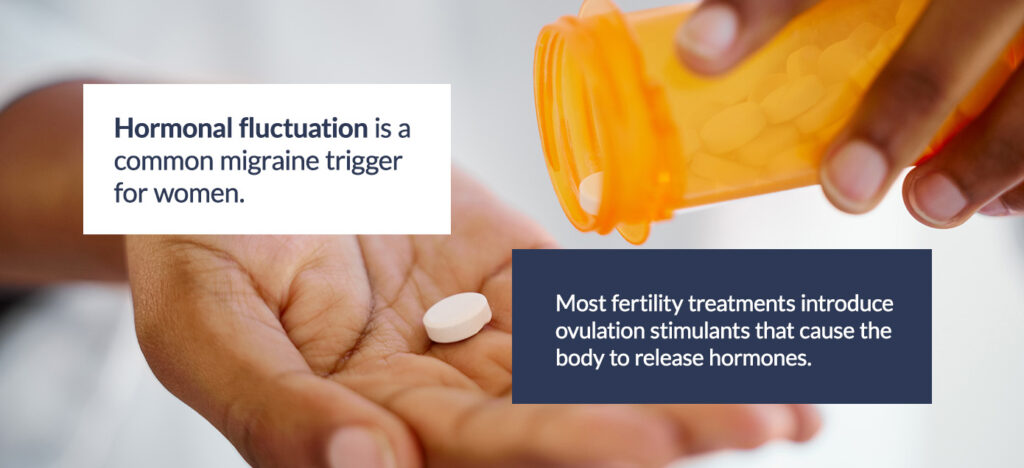- The impact of fertility treatments on migraine
- What fertility treatments affect migraine?
- Does migraine cause infertility?
- Managing migraine during fertility treatment
Studies show that women are three times more likely than men to experience migraine attacks. The link between female hormones and migraine is well established. In fact, many women suffer from worse migraine attacks closer to menstruation, when estrogen levels drop. Hormone fluctuations also occur during fertility treatments, which can change migraine frequency and intensity for some women.
The fertility journey can be a roller coaster of emotions, and dealing with increased migraine attacks can make it much more challenging. Thankfully, there are multiple things you can try to reduce migraine pain and frequency. This guide explores the link between fertility treatments and migraine to help you understand what’s happening. It also offers tips to help you manage migraine symptoms during treatment.
The impact of fertility treatments on migraine
While undergoing fertility treatments, your migraine symptoms and treatment plan may change. Learn more about these two scenarios below.
Increased attacks
Sometimes, women undergoing fertility treatment report an increase in migraine attacks. The reason for this is that hormonal fluctuation is a common migraine trigger for women. Reproductive hormones — mainly estrogen and progesterone — change throughout the menstrual cycle to prepare the ovaries and uterus for pregnancy. Closer to menstruation, estrogen levels dip significantly. This change is known to cause menstrual migraine and hormone headaches.
Most fertility treatments introduce ovulation stimulants that cause the body to release hormones. You may need to take fertility medication on its own or in combination with other fertility treatments. Your hormone levels fluctuate while on these medications, which may exacerbate migraine.

Treatment changes
Before you start any fertility treatments, your doctor may recommend a change to your migraine treatment plan. During pregnancy, you’ll need to avoid specific migraine medications, as they could potentially harm your developing baby. Some migraine drugs can cause congenital disabilities, while others can increase your risk of bleeding, miscarriage and heart complications. Consult with your doctor to find out which medicines you must stop taking. You may have to lean more on over-the-counter medications and other non-drug options.
What fertility treatments affect migraine?
The fertility journey often starts with taking fertility drugs. If these prove unsuccessful, your doctor may recommend more involved fertility treatments. Here is some more information about common treatment types and how they affect migraine:
- Fertility drugs: For women who are unable to get pregnant naturally, fertility medication can help. Some common fertility drugs include clomiphene, metformin and gonadotropins. They stimulate ovulation by introducing hormones. If you have migraine, you may experience worse attacks more often because of the hormonal shift.
- Intrauterine insemination (IUI): IUI is a fertility procedure involving artificial insemination, where a doctor selects better-quality sperm and places them directly in the uterus. You may get a migraine headache after IUI due to the hormonal fluctuations the procedure and medication causes.
- In vitro fertilization (IVF): IVF is an assisted reproductive technology where doctors retrieve healthy eggs and fertilize them within a lab. Then, they place the fertilized egg inside the uterus. Just like with IUI, IVF and migraine go hand in hand. Many women get headaches from IVF stimulation at the start of treatment. If you have a history of migraine, you may get an IVF migraine early on. It’s also common to have migraine attacks after an IVF transfer as your reproductive hormones spike.
Get Drug-Free Migraine Relief With CEFALY
Shop Now
90-day money back guarantee
FDA-cleared
financing available
Does migraine cause infertility?
There is no clear evidence to suggest that migraine causes infertility. While migraine doesn’t cause infertility, researchers have found a connection between the two. Women with health conditions that affect fertility — including polycystic ovary syndrome (PCOS) and endometriosis — are more vulnerable to migraine. The reason for this is that these conditions often cause hormone imbalances, which can increase the risk of developing migraine.
However, women with severe migraine often choose not to have children. They may not want to get pregnant because they believe:
- Pregnancy will make migraine worse: Some people do indeed have worse migraine during pregnancy. However, others may see an improvement in their migraine symptoms during pregnancy.
- Migraine will complicate pregnancy: Studies show that migraine can increase the risk of pregnancy complications such as pre-eclampsia, gestational hypertension and preterm delivery. However, consistent monitoring and early treatment can decrease this risk.
- Migraine will cause birth abnormalities: No research suggests that migraine causes congenital disorders. However, some migraine medications may increase the risk. The best way to avoid this is to take pregnancy-safe migraine medications or none at all.
Try CEFALY to Prevent & Relieve Migraine Pain
Managing migraine during fertility treatment
It’s normal to worry about managing migraine during your fertility journey. The disease can make starting a family more difficult. Luckily, there are multiple treatment options available to help you along the way. Here are just some of the things you can try to reduce attacks and relieve migraine pain:
- Consult a doctor: The first step in your fertility journey should be to consult your doctor. They’ll address all your concerns, review your information and create a personalized treatment plan.
- Connect your providers: Your migraine doctor knows your migraine history, which is vital for your reproductive endocrinologist to know, too. Speak with them and ask if they are willing to integrate their care. This way, both doctors can help you manage your migraine throughout the fertility treatment process.
- Take pregnancy-safe medications: Some migraine medications are safe to take during fertility treatment and pregnancy. You can also take supplements like magnesium to help reduce the frequency of attacks.
- Practice self-care: It’s important to take care of yourself to reduce migraine pain and frequency. Get plenty of sleep, eat healthy food, drink lots of water and try to do some gentle exercise every day.
- Avoid migraine triggers: Keep a migraine diary and track what triggers your migraine. Before and during fertility treatment, try your best to avoid your triggers.
- Try neuromodulation: Neuromodulation devices like CEFALY use electrical stimulation to safely reduce and prevent migraine pain.
Safely relieve migraine symptoms with CEFALY
CEFALY Technology creates FDA-cleared neuromodulation devices that help alleviate migraine pain and give you more migraine-free days. Our devices are a safe, drug-free treatment option with minimal side effects and no prescription needed. They use external trigeminal nerve stimulation (eTNS) to target the primary pathway for migraine pain.
If you’re struggling with intense migraine attacks during fertility treatments, CEFALY can be an effective solution. In fact, 79% of users in one study said they had significantly less headache pain after just one hour of using CEFALY’s ACUTE treatment mode. You can also use the PREVENT mode to reduce your migraine days. Pair your CEFALY Connected device with the CeCe Migraine Management app, to track your migraine triggers, symptoms, and treatments. Detailed logs will help you identify patterns and prevent future attacks.
With CEFALY, you can take control of your migraine treatment during your fertility journey. Try a CEFALY device for 90 days with a money-back guarantee!















